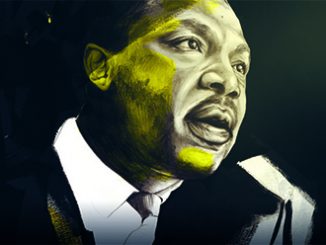 In German, the word ‘ersatz’ is a noun, and doesn’t necessarily contain a suggestion of inferior quality. It just means substitute. Of course, in our language, it functions as an adjective and carries intimations of shoddiness and tack. It feels like the perfect word for Simon Stone’s new production of Chekhov’s The Cherry Orchard.
In German, the word ‘ersatz’ is a noun, and doesn’t necessarily contain a suggestion of inferior quality. It just means substitute. Of course, in our language, it functions as an adjective and carries intimations of shoddiness and tack. It feels like the perfect word for Simon Stone’s new production of Chekhov’s The Cherry Orchard.
I use the attribution purposefully, even though this particular production is billed as ‘The Cherry Orchard, by Simon Stone after Anton Chekhov’. It seems we are meant to be thankful that Anton gets a look in at all. This is Simon’s show and we will laugh and cry when Simon says.
Needless to say, I barely laughed and never once came close to crying, except perhaps during Act III, when tears of frustration and disgust threatened to stream forth. By then I was unprepared to forgive the tonal deafness and meaningless associations. All the garish screeching and ludicrous interplay had grown tiresome and wan. My goodwill had been thoroughly spent by Stone’s insistent and blustery direction. Even the great white set was off-putting.
Stone sets his Orchard in Australia in the 70s, although this is never stated by anyone but the costume designer [Alice Babidge, with one of the better efforts of the night]. To what end, you’d have to ask him. I’m perfectly up for some radical readjustment to the classics, and was absolutely thrilled by this director’s production of Ibsen’s Wild Duck. Even the jarring incongruities of his Aussie-set Death of a Salesman had its charms. But Chekhov is not Ibsen or Miller. Close enough is never going to be good enough.
Ranevskaya [Pamela Rabe] and her brother Gaev [Robert Menzies] return to the property of their childhood, burdened by irrefutable debts and an inability to conceive their own demise. ‘Property developer’ and neighbour Lopakhin [Steve Mouzakis, catastrophically channeling Kingswood Country] tries in vain to convince the family to sell the Orchard and subdivide the land into allotments. They are, as Stone makes explicit and Chekhov keeps implicit, ostriches in the sand and Lopakhin their only hope.
As with most Chekhov, the time is spent with swathes of characters lolling about, moaning loudly and inarticulately of their miserable lives. In other words, joyously authentic and entertaining. As written. By Anton Chekhov. As written by, and performed under the direction of, Simon Stone, it’s a whiny, tedious mess.
The Australian 70s setting grates against the play; but then, inconceivably, Stone’s long-winded adaptation and playing style grates against the Australian 70s setting. Gareth Davies as Yephikhov seems like a Hamish Blake ersatz, and is kind of adorable in the process. But he is utterly contemporary. The music, the idiom, virtually every attitude expressed by the actors places this in the here and now. So tell me again, why the hell are we in the 70s?
Some of the time, some of this production works. The set is intriguing and takes on a haunting poignancy whenever characters find themselves adrift. The giant rocking horse and the tennis pole, even the stuffed bear, suggest childish things made ludicrous by adult bodies. Some performances are good. Zahra Newman makes a lovely Varya and Robert Menzies gives untapped pathos to Gaev. Roger Oakely is perfect as Pishchik. I also admired Katherine Tonkin’s Charlotta, ditsy but damaged, and forever watchful for a place to perch.
But so many of the roles are ill conceived. Trofimov [Toby Truslove] makes no sense as the revolutionary student in an Australian context. His love affair with Anya [Eloise Mignon, so good in Wild Duck and so awful here] is frankly bathetic.
The servants come across as family members and the aristocracy as comfortably middle-class. Rabe, a fine actor whom this reviewer looked forward to seeing in this role, is all at sea. Her Ranevskaya is cloying and irritating, all of which is forgivable. She is also superficial, which is not. The tricks with the telegrams may have gotten a few cheap laughs, but her despair over the dead child is barely felt, and totally unmoving.
Dramaturgy matters most in a production like this. Why this play and why now? I sense a grafting of purposes here. Someone somewhere in the bowels of the MTC suggested The Cherry Orchard and some other, equally clever boffin, threw up the name Simon Stone. They are an indescribably bad partnership. Chekhov is nuanced, and Stone is not.
That apocryphal conversation that Chekhov and Stanislavski were rumoured to have regarding the comic or tragic nature of this play has been resolved in this instance. It is neither. A crass and unconvincing simulacrum. In other words, an utter ersatz.
The Cherry Orchard
Southbank Theatre, The Sumner – 140 Southbank Boulevard, Southbank
Season continues to 25 September 2013
Bookings: (03) 8688 0800 or online at: www.mtc.com.au
For more information, visit: www.mtc.com.au for details.
Review: Tim Byrne Image: by Jeff Busby


